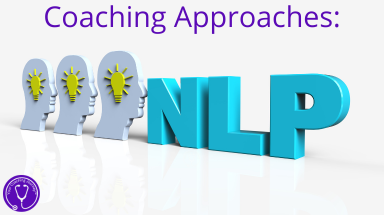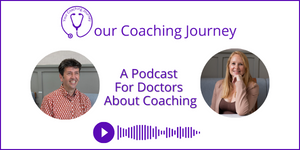We sometimes get asked if we teach NLP (Neuro Linguistic Programming) on our Doctors’ Transformational Coaching Diploma and the answer is mostly no, and also, a little bit, yes. For this reason we thought it would be useful to have a conversation about it on our podcast and this is a summary of what we discussed.
NLP Coaching
We are both trained and licensed NLP practitioners, and although we gained something from our training, neither of us actually practise NLP. We do, however, weave some of our learning into our individual ways of working and include some elements that you might find on an NLP course in our own training, although we credit the original source of those elements which, more often than not, is not NLP.
In this article we explore what NLP is, its limitations and uses in the coaching room and, as always, our own thoughts on the subject including why it isn’t included as an approach within our programmes.
The History Of NLP
Many people will think NLP is a fairly new thing, but it was first talked about in about 1975. It was devised by Richard Bandler and John Grinder and they wrote about it in their book, The Structure of Magic.
It was during the ’90s when it really took off and everyone was talking about it. Interest in it seems to have died off a bit now and there was a time where it was linked with fairly dubious techniques and activities, for example, by men to persuade women to go on dates with them. We’re not suggesting that formal NLP training is any way manipulative or that there is an intention for people to use it in a way that’s not ethical. But because a large part of it is a model of communication and influence, to a degree, it’s got the potential to be hijacked by certain groups or individuals.
Note: Our NLP trainers were brilliant and very ethical. We learnt a lot from them and loved the time spent on their courses.
The history of the founders of NLP is interesting as well. Bandler and Grinder were together for about four years and then had a bit of a falling out. So there are two different versions of NLP. They fought court cases for NLP rights for many years ending up with it not being copyrighted or trademarked. Yes, anyone can call themselves an NLP practitioner. Anyone can do an LP training because it’s not protected anyway.
What Is NLP?
Whilst language is a really big part of NLP, that’s not all of it. NLP is an approach to coaching, or to therapy, that asserts a link between neurological processes, language, and behavioural patterns. It’s said to be good for lots of different things, it can help with phobias, confidence, changing our ways of thinking, challenging underlying, perhaps faulty or unhelpful thinking. Also, modelling is a big part of NLP: looking at how someone else is doing something well, and then how you could model that behaviour or that way of being so that you can do it as well.
NLP was derived by Bandler and Grinder’s observations of what some psychotherapists and psychologists did that, in their opinion, worked really well.
They were observing the elements that other people found useful and worked, like Milton Erickson’s language when he was using clinical hypnosis. They observed what he did and how he did it and codified it, creating a model that is taught within NLP. They modelled others and encouraged modelling: ‘This is how X does it, and if I do it like them, then I will also be successful or effective.
They took a lot from:
- Milton Erickson, a psychiatrist and psychologist specialising in medical hypnosis and family therapy.
- Fritz Perls, a psychiatrist, psychoanalyst and psychotherapist who developed Gestalt therapy.
- Virginia Satir, clinical social worker and psychotherapist, involved in family therapy and ‘Parts’ work.
- and many others
They also mixed in a lot of solution-focused coaching and cognitive behavioural therapy / coaching,
Other than maybe Satir and Erickson, the other elements aren’t really attributed to their original sources.
We understand this, why reinvent the wheel? Our transformational coaching approach is definitely a bundling of other people’s work from similar theories and approaches, but we attribute it to the original source! We cover:
- the person-centred approach,
- the solution-focused approach,
- the cognitive behavioural approach,
- positive psychology
- gestalt coaching
- transactional analysis
Our students learn about all the different approaches that might be useful in the coaching room and they also know where it originates from.
Some of the Limitations of NLP (in our opinions)
No Coaching Framework: There are lots of models and exercises involved in NLP. In fact, it could be seen as a big bundle of tools, models and techniques, but, depending on where you train, without any framework that we might have in the coaching space.
Similar to the positive psychology approach, which we’ve covered previously (Podcast Episode 25 / Article), where there are lots of positive psychology interventions that you might use in coaching, you wouldn’t turn up and just do those interventions. Both positive psychology and NLP coaching has to be done within a coaching framework where you can introduce relevant and appropriate tools and techniques.
No Evidence Base: If you look NLP up on Wikipedia, (which we do appreciate, is not the font of all knowledge and certainly should not be where you do your scientific research) it is described as a pseudoscience. And therein lies the challenge, unlike positive psychology coaching, NLP is lacking any robust academic research in to the effectiveness of those tools and techniques.
Missing a key ingredient: NLP training often includes being taught about working ‘content-free’, i.e we don’t need the story. But we know that being heard is healing, and sometimes people need to tell their story.
Potentially invalidating: NLP can very quick and almost dismissive of the space to think (not always, but it can be). We’ve observed NLP practitioners talking to someone about a problem and being very dismissive of their thinking, just telling the client that ‘It’s faulty thinking. You need to think differently’. Whilst this will depend on the training received, and the experience and personality of the practitioner, coaching should be non-judgmental, and not dismissive, reductive, and directive which this way of being is.
Was NLP Training Useful To Our Work As Coaches?
We’ve talked together about this many times. We didn’t know each other when we did our NLP training, yet we both had exactly the same thoughts on it.

Helen Says:
“On the last day on my intensive course, I remember saying to someone, ‘but how do I run a coaching session with this? Do I need to go and do a coaching qualification?’ And I was told, No, you don’t need a coaching qualification. You’ve got this skill now, that’s enough.’
I did learn a lot. I loved it, there were magical moments of realisation and transformation, but looking back, those techniques were from cognitive behavioural coaching, and the things that I loved already, which was meditation and being able to help someone to relax or be mindful. I left thinking, this is great, but what do I do with it now?”

Tom Says:
“My experience of the course was great. It was two lots of four days, so very intense, very immersive. A lot of the time you’re drawn to these things because you need something from them and I was going through a tough time. I think a lot of that came out in the course.
Before I did it, I never really did any public speaking, and I had a bit of a fear of it. I thought I wouldn’t be able to do it, and I couldn’t do it. Having done some exercises, I left with the belief that I could do public speaking. Now, I didn’t actually try it out, but I left with that belief. So there was something there that shifted for me. And certainly, I talked about my long-standing relationship and got some shift on that.
But as with any of these immersive weekends, things come up for you and you resolve them. I’m not sure how much of it was just being in that environment. What I learned was lots of different techniques, and I came away with an idea of them, and they were modelled and we practised them, but very quickly. We maybe had one go at doing it, and then came away and did something else, like hypnotic language. What it didn’t allow me to do was hold a coaching space for someone.”
An NLP Approach to Coaching?
We both certainly use some NLP techniques in our coaching. And we teach some techniques on our courses, like ‘empty chair’ work, which comes from Gestalt, (which NLP teaches as ‘perceptual positions’). And we use a model on our courses that does actually come from NLP., Robert Dilts’ model of the levels of change, because it’s a good model. We don’t use it because it’s NLP. It just happens to come from NLP. Spotting inconsistencies and challenging assumptions is also a big part of NLP training, and useful in coaching, and again, it comes from cognitive behavioural world.
If anyone has done NLP training and they come on our course, they might recognise some of the tools and technique but we don’t say that we teach NLP on our course because we have pulled what we consider the most transformational models and exercises from other forms of coaching and psychotherapy, as Bandler and Grinder did.
In Summary
As an approach to coaching, there are lots of interesting tools within NLP, but we don’t feel you could do a purely NLP course and come away and be a coach. There may well be coach training that layers in NLP, or NLP training that also teaches coaching skills.
What we want to do here is just shine a little bit of light on the world of NLP and help people to understand where it came from. We’re not entirely dismissive of it, we both gained a lot from our training, we just don’t feel it’s sufficient as a stand-alone training if you want to be a coach. And hopefully it helps to explain why you won’t see NLP listed on our list of approaches that we cover on our courses.
You can find out more about our Transformational Coaching Diploma here.



